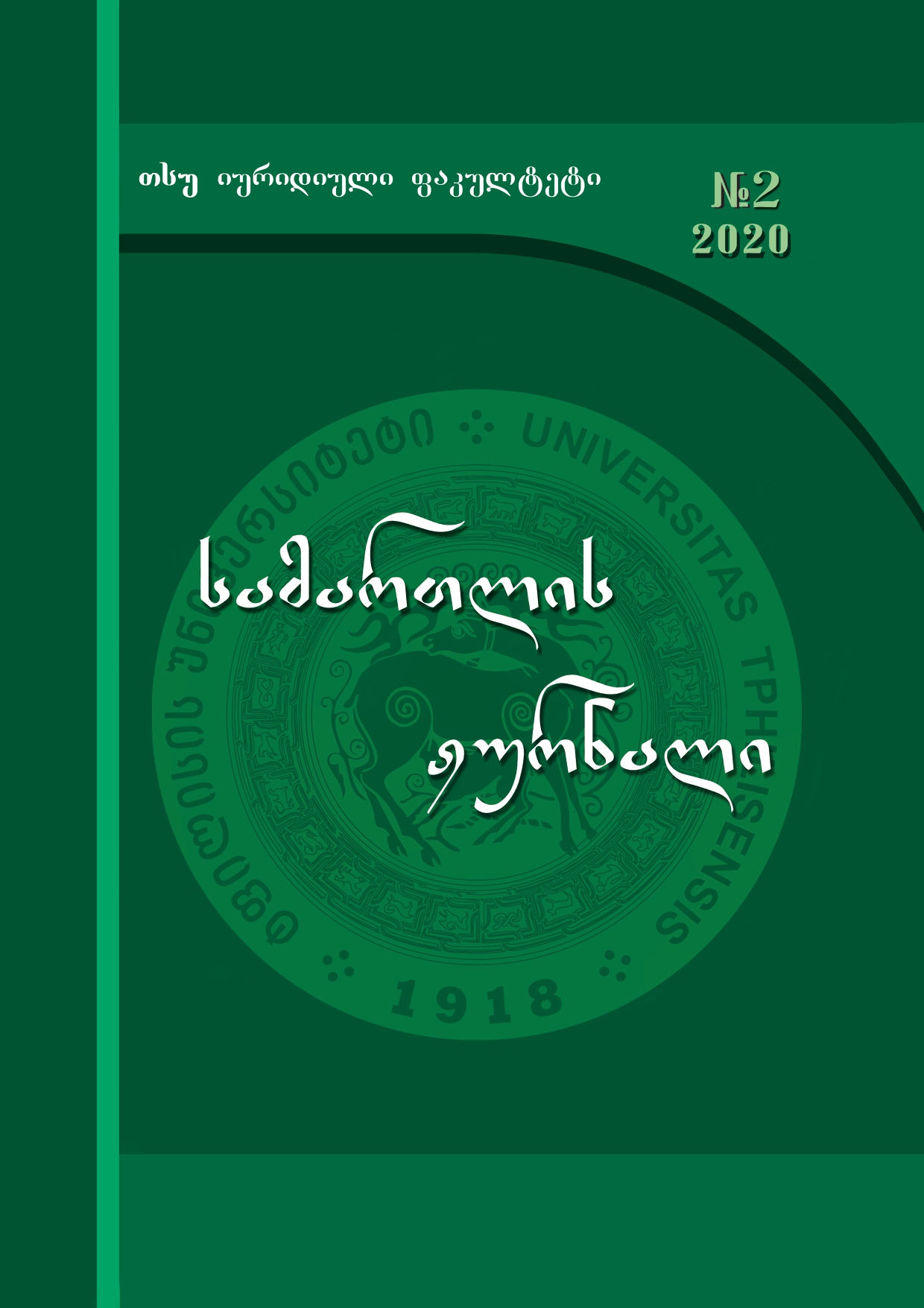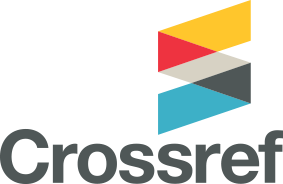ადმინისტრაციულ ნორმაშემოქმედებაში ხალხის მონაწილეობის ელექტრონული ფორმა ამერიკის შეერთებულ შტატებში და საქართველოში
DOI:
https://doi.org/10.48614/jlaw.2.2020.162-179საკვანძო სიტყვები:
ცნობის ელექტრონულად გამოქვეყნება, მოსაზრების ელექტრონულად გამოქვეყნება, ელექტრონული ნორმაშემოქმედება, ადმინისტრაციული ნორმაშემოქმედება, ელექტრონული ჩანაწერი.ანოტაცია
ამერიკის შეერთებულ შტატებში და საქართველოში ადმინისტრაციული გადაწყვეტილების მიღების პროცესში ხალხის როლის გასაზრდელად, ადმინისტრაციული ორგანოები ადმინისტრაციულ ნორმაშემოქმედებაში ხალხის ელექტრონული საშუალებების გამოყენებით მონაწილეობას მიმართავენ. შესაბამისად, ამერიკის შეერთებულ შტატებში და საქართველოში ცნობა ადმინისტრაციული ნორმაშემოქმედების შესახებ, ქვეყნდება როგორც დოკუმენტური ფორმით, ისე ადმინისტრაციული ორგანოს ვებგვერდზე. თუმცა, ამერიკის შეერთებული შტატებისგან განსხვავებით, საქართველოს ზოგადი ადმინისტრაციული კოდექსი არ ითვალისწინებს ადმინისტრაციულ ნორმაშემოქმედებასთან დაკავშირებით მოსაზრების ელექტრონულად წარდგენის შესაძლებლობას.
წინამდებარე სტატიაში გააანალიზებულია ცნობის ელექტრონულად გამოქვეყნების და მოსაზრების ელექტრონულად წარდგენის ― ელექტრონული ნორმაშემოქმედების მნიშვნელობა და თავისებურებები, გამოკვლეულია ელექტრონული ნორმაშემოქმედების დადებითი და უარყოფითი მხარეები და შემოთავაზებულია მისი გაუმჯობესების გზები.
წყაროები
General Administrative Code of Georgia, LHG, 32(39), 15/07/1999.
Adler M., Administrative Justice in Context, Hart Publishing, Oxford and Portland, Oregon, 2010, 55.
Benjamin S. M., Evaluating Rulemaking Public Participation and Political Institutions, Duke Law Journal, Vol. 55, March, 2006, 899, 902, 904, 909, 936.
Brandon B. H., An Update on the E-Government Act and Electronic Rulemaking, Administrative and Regulatory Law News, 29, Fall, 2003, 8.
Brandon B. H., Carlitz R. D., Online Rulemaking and Other Tools for Strengthening our Civil Infrastructure, Administrative Law Review, Vol. 54, Fall, 2002, 1470.
Coglianese C., Enhancing Public Access to Online Information, Michigan Journal of Environmental and Administrative Law, Vol. 2, Fall, 2012, 22-23, 39.
Coglianese C., Citizen Participation in Rulemaking: Past, Present and Future, Thirty-Fifth Annual Administrative Law Issue The Role of the Internet in Agency Decision making, Duke Law Journal, Vol. 55, March, 2006, 943, 960-962, 968.
Coglianese C., Information Technology and Regulatory Policy: New Directions for Digital Government Research, Social Science Computer Review, Vol. 22 (1), Spring, 2004, 85-91.
Coglianese C., The Internet and Citizen Participation in Rulemaking, I/S: A Journal of Law and Policy for the Information Society, Vol. 1, Winter, 2005, 33, 44.
Coglianese C., Kilmartin H., Mendelson E., Transparency and Public participation in the Federal Rulemaking Process: Recommendations for the New Administration, Annual Review of Administrative Law Report, George Washington Law Review, Vol. 77, June, 2009, 939-940.
Coglianese C., Shapiro S., Balla S. J., Unifying Rulemaking Information: Recommendations for the New Federal Docket Management System, Administrative Law Review, Vol. 57, Spring, 2005, 629.
Dooling B. C. E., Legal Issues in E-Rulemaking, Administrative Law Review, Vol. 63, Fall, 2011, 896-897.
Farina C. R., Achieving the Potential: The Future of Federal Rulemaking (2009) Report of the Committee on the Status and Future of Federal E-Rulemaking, Administrative Law Review, Vol. 62, Winter, 2010, 282, 283, 285, 287-288.
Farina C. R., Newhart M. J., Cardie C., Cosley D., Rulemaking 2.0, Symposium: What Change Will Come: The Obama Administration and the Future of the Administrative State Articles, University of Miami Law Review, Vol. 65, Winter, 2011, 396, 397.
Field A. B., Comments on a truly “Top Task:” Rulemaking and its Accessibility on Agency Websites, Environmental Law Institute and Vanderbilt University Law School Environmental Law and Policy Annual Review Article and Response, Environmental Law Reporter News and Analysis, Vol. 44, August, 2014, 10668.
Figueiredo J. H., E-Rulemaking: Bringing Data to Theory at the Federal Communications Commission, Duke Law Journal, Thirty-Fifth Annual Administrative Law Issue, The Role of the Internet in Agency Decision-making Articles, Vol. 55, March, 2006, 974-975.
Fountain J. E., Prospects for improving the Regulatory Process Using E-Rulemaking, Communications of the ACM, Vol. 46, № 1, January, 2003, 63.
Furlong S. R., Kerwin M. C., Interest Group Participation in Rule Making: A Decade of Change, Economics of Administrative Law, Rose-Ackerman S. (ed.), Edward Elgar Publishing, Inc., An Elgar Reference Collection, Chentelham, UK, Northhampton, MA, USA, 2007, 332.
Herz M., Chair’s Message, Administrative and Regulatory Law News, Vol. 37, Summer, 2012, 2.
Jones G. D., Electronic Rulemaking in the New Age of Openness: Proposing a Voluntary Two-Tier Registration System for Regulations.Gov, Administrative Law Review, Vol. 62, Fall, 2010, 1270, 1275-1277.
Johnson S. M., Beyond the Usual Suspects: ACUS, Rulemaking 2.0, and a Vision for Broader, More Informed, and More Transparent Rulemaking, Administrative Law Review, Vol. 65, Winter, 2013, 91, 97-98. 107, 108, 109.
Johnson S. M., The Internet Changes Everything: Revolutionizing Public Participation and Access to Government Information through the Internet, Administrative Law Review, Vol. 50, Spring, 1998, 329-330.
Lubbers J. S., A Survey of Federal Agency Rulemakers’ Attitudes about E-Rulemaking, Administrative Law Review, Vol. 62, Spring 2010, 471, 472, 473-474.
Lubbers J. S., The Transformation of the U.S. Rulemaking Process-For Better or Worse, Ohio Northern University Law Review, Vol. 34, 2008, 479.
Milosz M., Tykwinska-Rutkowska D., The Concept of “E-Administration” and the Regulatory Framework for Electronic Administration in Polish Law, Computer and Telecommunications Law Review, Vol. 14 (4), 2008, 100.
Noveck B. S., Public Participation in Electronic Rulemaking: Electronic Democracy or Notice-and-Spam? Administrative and Regulatory Law News, Vol. 30, Fall, 2004, 8, 9.
Noveck B. S., The Electronic Revolution in Rulemaking, Emory Law Journal, Vol. 53, Spring 2004, 516.
Paul G. L., Baron J. R., Information Inflation: Can the Legal System Adapt? Richmond Journal of Law and Technology, Vol. 13, Spring, 2007, 67.
Reitz J.C., E-Government, American Journal of Comparative Law, Vol. 54, Fall, 2006, 747.
Shulman S. W., the Internet Still Might (But Probably Won’t Change everything), I/S: A Journal of Law and Policy for the Information Society, Vol. 1, Winter 2004/2005, 128.
Shkabatur J., Transparency with(out) Accountability: Open Government in the United States, Yale Law and Policy Review, Vol. 31, Fall, 2012, 97.
http://people.umass.edu/stu/eRulemaking/Crossroads.pdf, 2, 5, 10, 11, 13-15, 17, 39 [12.10.2011].
http://www.law.upenn.edu/academics/institutes/regulation/erulemaking/papersandreports.html [10.09.2010].
https://www.law.upenn.edu/institutes/regulation/erulemaking/papers_reports/Herz_E_Rulemaking.pdf [10.09.2010].
http://www.hks.harvard.edu/m-rcbg/research/rpp/RPP-2003-05.pdf, 6 [30.10.2012].
http://www.info-ren.org/publications/cof/cof_0210.html [10.09.2010].
http://www.law.upenn.edu/academics/institutes/regulation/erulemaking/papersandreports.html [10.09.2010].
http://www.digitalgovernment.org/library/library/dgo2001/MEDIA/DRAKE.PDF [10.09.2010].
ჩამოტვირთვები
გამოქვეყნებული
როგორ უნდა ციტირება
გამოცემა
სექცია
ლიცენზია

ეს ნამუშევარი ლიცენზირებულია Creative Commons Attribution-ShareAlike 4.0 საერთაშორისო ლიცენზიით .









